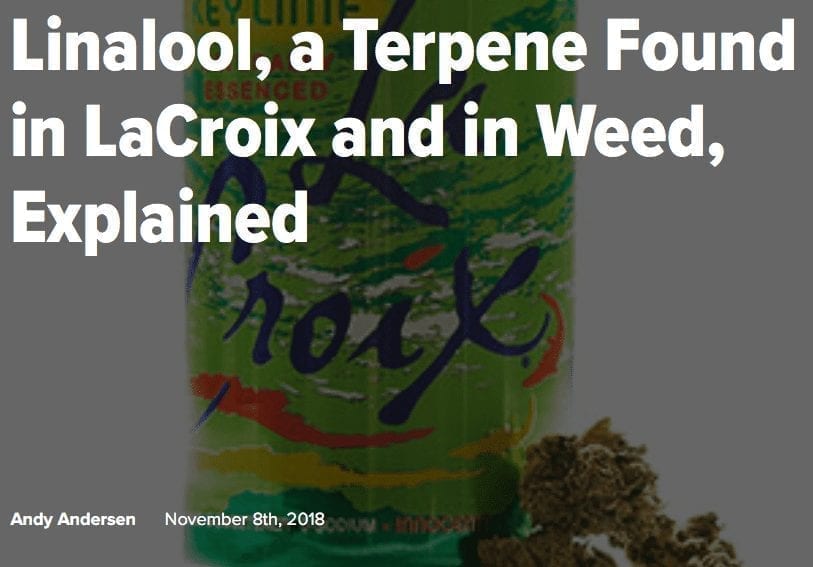Business, Cannabis Science
Linalool, a Terpene Found in LaCroix and in Weed, Explained
It’s been a rough year for LaCroix.
National Beverage Corp., the company behind everyone’s favorite bubbly, memeable mystery water, was hit with a class-action lawsuit on Oct. 8, 2018, for including linalool, a terpene that’s commonly used in cockroach poison. The lawsuit, which according to a CBS News report alleges that National Beverage is “intentionally misleading consumers” by including “synthetic chemicals” in its supposedly “100% natural” product, sparked a wave of public concern and media attention that highlighted the linalool-and-cockroach poison connection.
Apparently, people don’t like the idea of drinking something they’ve been told is an insecticide, no matter how tasty or refreshing.
Don’t go dumping all of your LaCroix just yet, however. The beverage does contain linalool, and yes, linalool is a frequently used ingredient in insecticides. But lest we forget, a cockroach (with very few exceptions) is not a human being. For humans, linalool is a non-toxic, and maybe even beneficial, compound that’s readily available in ginger, lavender — and your weed.
Here’s What We Know About LaCroix
For the last several years, LaCroix has been something of a cultural phenomenon — one of a handful of brands to rise from obscurity and reap the rewards of America’s current sparkling water obsession.
It’s been the subject of memes, lifestyle posts, T-shirts, New York Times essays, and endless enthusiastic endorsements from all of your friends who can’t get enough of their favorite LaCroix flavor. (Key Lime LaCroix is consumed with something akin to reverence among the Marijuana.com staff). And it’s all been to LaCroix’s benefit — the company pulled in a cool $827 million in sales in 2017, according to Popular Science.
And now people are afraid it might be poison.
Here’s What We Know About Linalool
But here’s the thing: Linalool is not toxic by mere virtue of its presence in cockroach poison. Nor is it necessarily a synthetic chemical; linalool is naturally occuring and found in a variety of flowers and plants.
In an official statement following the lawsuit, National Beverage reaffirmed that “natural flavors in LaCroix are derived from the natural essence oils from the named fruit used in each of the flavors.” And while that statement may seem as confusing as it is meaningless, linalool would certainly fit that criteria as a terpene.
Terpenes are aromatic molecules that provide aroma and flavor in a variety of plants, including cannabis. As the central components of essential oils, terpenes have been extracted from a wide variety of plants and foods, and used for medicinal purposes for thousands of years. Linalool carries a floral aroma that’s often used in soaps, perfumes, and cosmetics. It’s present in several widely used essential oils, including rosewood, bergamot, coriander, rose, jasmine, and lavender.
Other than the potential to cause skin irritation in cosmetics, and only when overexposed to oxygen, linalool’s documented effects have proven to be non-toxic and overwhelmingly positive. It’s one of many terpenes with anti-inflammatory, anticonvulsant, and sedative potential. A study on the effects of essential oils on breast cancer concluded that linalool has potential to assist commercial drugs in killing breast cancer cells. Linalool research has also been found that it can inhibit the growth of fungal infections, relieve cardiovascular hypertension, and may be able to fight lymphoma cells. Linalool-rich essential oils from the Amazon even displayed anti-depressant effects when tested on rats.
What Linalool Does in Your Weed
You might have gotten this far and thought, “Didn’t this article say something about weed?” Indeed it did. You see, terpenes play an important and specific role in cannabis and cannabis products. Whether you prefer the sweet, citrusy flavor of Tangerine Dream or the pungent, fuel-like aroma of Sour Diesel, terpenes are responsible for the aroma and flavor profiles of every cannabis cultivar you crave.
Cannabis cultivars, often called strains, with floral, fruity and spicy scents may have high amounts of linalool. In addition to contributing to the aroma and flavor profile of a particular cultivar, linalool may also contribute health benefits as a potential anti-inflammatory, anticonvulsant, and sedative. Lastly, as a terpene, linalool may also enhance the therapeutic abilities of the other compounds found in cannabis.
If you’re familiar with cannabis, you may have heard of the entourage effect. Also called the ensemble effect, it’s an increasingly popular term to describe the way cannabis compounds work together to produce desired effects. Just as each instrument in an orchestra contributes to the overall experience of a piece of music, an “ensemble” of compounds contribute to the overall experience of cannabis. A dominant cannabinoid such as tetrahydrocannabinol (THC) or cannabidiol (CBD) may be conducting, but the terpenes are still contributing to the plant’s overall effect on your body.
The ensemble effect is why whole-plant cannabis is generally thought to have greater medicinal value than isolated cannabis compounds.
Isolated CBD, for example, is frequently marketed and sold as a medicine. But depending on what you’re taking CBD for, it may be more effective as part of a whole-cannabis product, in which terpenes and other molecules are still present to induce similar effects. If you’re taking CBD as an anticonvulsant or antiepileptic, the anticonvulsant properties of linalool may reduce your chances of experiencing seizures.
So, while it’s true that linalool is in cockroach poison, it’s also perfectly safe, non-toxic, and may even be healthful in your favorite cultivar or can of LaCroix.
Read more from the source: News.Weedmaps.com


